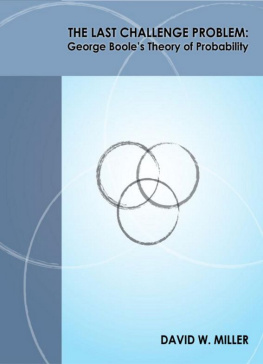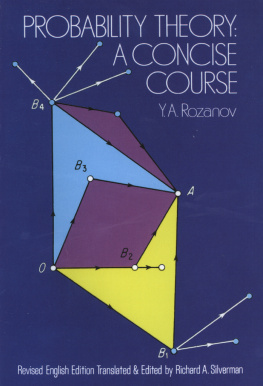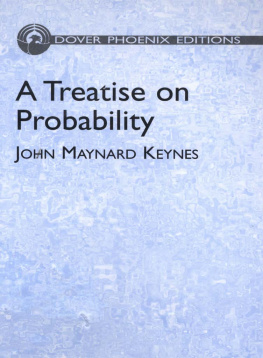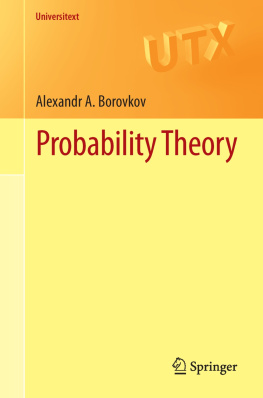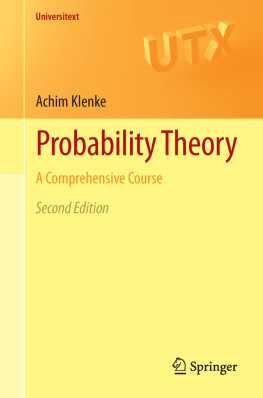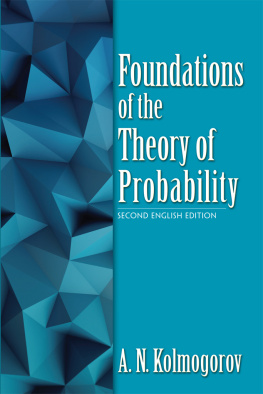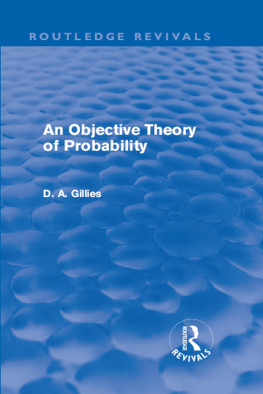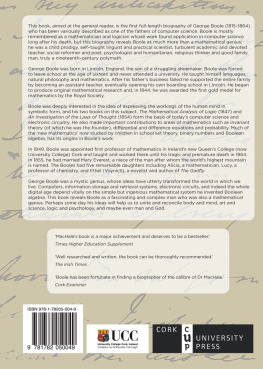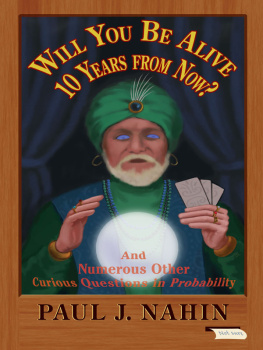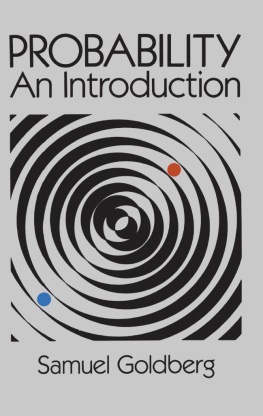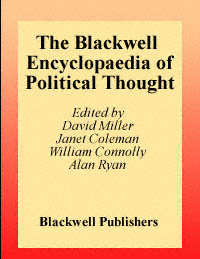David W. Miller - The Last Challenge Problem: George Booles Theory of Probability
Here you can read online David W. Miller - The Last Challenge Problem: George Booles Theory of Probability full text of the book (entire story) in english for free. Download pdf and epub, get meaning, cover and reviews about this ebook. year: 2012, genre: Romance novel. Description of the work, (preface) as well as reviews are available. Best literature library LitArk.com created for fans of good reading and offers a wide selection of genres:
Romance novel
Science fiction
Adventure
Detective
Science
History
Home and family
Prose
Art
Politics
Computer
Non-fiction
Religion
Business
Children
Humor
Choose a favorite category and find really read worthwhile books. Enjoy immersion in the world of imagination, feel the emotions of the characters or learn something new for yourself, make an fascinating discovery.
- Book:The Last Challenge Problem: George Booles Theory of Probability
- Author:
- Genre:
- Year:2012
- Rating:3 / 5
- Favourites:Add to favourites
- Your mark:
- 60
- 1
- 2
- 3
- 4
- 5
The Last Challenge Problem: George Booles Theory of Probability: summary, description and annotation
We offer to read an annotation, description, summary or preface (depends on what the author of the book "The Last Challenge Problem: George Booles Theory of Probability" wrote himself). If you haven't found the necessary information about the book — write in the comments, we will try to find it.
The Last Challenge Problem: George Booles Theory of Probability — read online for free the complete book (whole text) full work
Below is the text of the book, divided by pages. System saving the place of the last page read, allows you to conveniently read the book "The Last Challenge Problem: George Booles Theory of Probability" online for free, without having to search again every time where you left off. Put a bookmark, and you can go to the page where you finished reading at any time.
Font size:
Interval:
Bookmark:
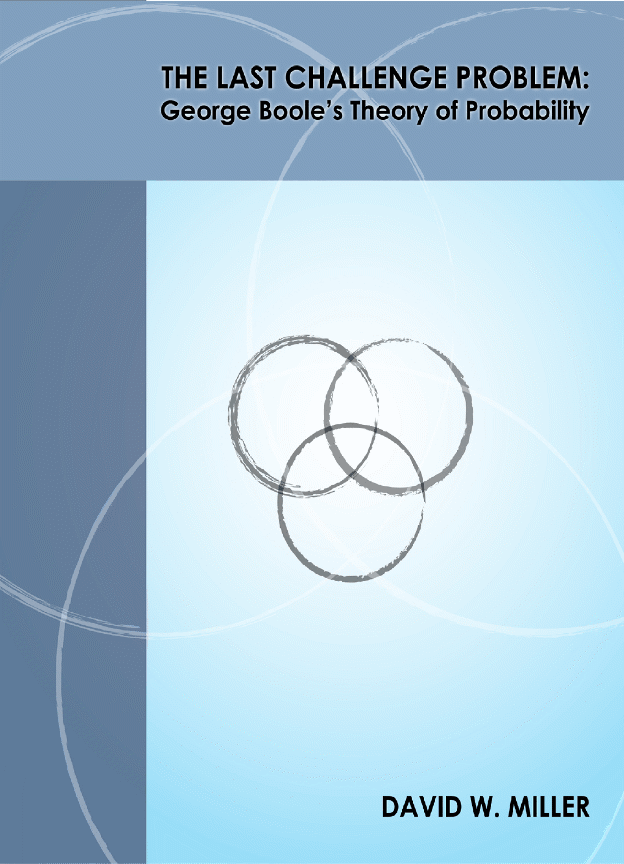
Smashwords Edition
Copyright David W. Miller 2009-2012. Allrights reserved.
This book is dedicated
to
REBECCA NICOLE MILLER
August 27, 1962 - January 2, 1968
who was cheated of everything
and to whom I could give nothing else
PREFACE
A preface is the place where an authortraditionally offers excuses and apologies, extends thanks,professes gratitude, and often suggests some justification for thebook that follows. I have no reason to diverge from that traditionexcept that I will reverse the order.
When I started to work out Booles theory ofprobability quite a few years ago I was familiar with the fact thatthis theory was considered to be wrong by everyone who commented onit. The theory as Boole presented it is remarkably difficult and,frankly, today as I look back on my efforts I wonder why Ipersisted. Mostly, I was sustained by the belief that a person ofBooles level of genius simply could not have created a theoryquite as bad as the comments about it would suggest. It thereforegives me considerable pleasure to demonstrate in this book thatBooles theory is not only consistent and reasonable - it actuallyworks on real-life problems. In this same context I am pleased tobe able to show that Booles method is equivalent, in a large classof real-world problems, to the application of Jaynes Principle,which has, seemingly, a completely different logicalunderpinning.
When I began writing this book I was unawareof any book dealing with Booles theory of probability since JohnMaynard Keyness A Treatise on Probability, published in 1921. Ihad not discovered the first edition (1976) of Theodore Hailperinsfine book, Booles Logic and Probability.
I became aware of the second edition (1986)when I was well into writing a preliminary version of the presentbook. My initial trepidation that my own work might already havebeen done disappeared when I found that Professor Hailperins goalswere quite different than mine. I have devoted a Section of thepresent book to my comments about his book so I need not discuss itfurther here.
I was pleased to discover Hailperins bookbecause it showed me that there were people still interested in theremarkable structure of Booles thought. When one concentratesattention on the title of Booles opus major, An Investigation ofthe Laws of Thought on Which are Founded the Mathematical Theoriesof Logic and Probabilities, it is evident that he considered histheory of probability to be on an equal level with his theory oflogic. Many early commentators thought that Boole developed hislogical theory precisely so he could use it in his probabilitytheory. This granted, there has been more than 100 years in whichthere has been no positive assessment or use of his probabilitytheory whatsoever. I certainly do not know of any comparableinstance where the major contribution of a great thinker has beenso consistently ignored.
Of course, there have always been a fewlovers of Boole - although it seems to be very few. One such personthat I must mention is Herbert F. Ayres. His untimely death was agreat loss to the management science profession. He had one of thefinest minds I have ever known and he was devoted to Booleanthinking in every area. The very many hours of discussion I hadwith Herb about the Boolean approach to just about everything werea major reason why I was sure there had to be a meaningfulprobability theory in Booles structure. I feel a very deep senseof loss in not having the opportunity to have Herb comment on thisbook.
I must express my thanks to my family. Mydaughter, Rachael, helped me with design questions, including thetitle page. My son, Jason, handled all of the computer and printerhook-ups that permitted me to finish this book and he also taughtme how to use them. Finally, my wife, Lisa Evered, offered constantencouragement and help as well as providing a sympathetic ear whenmy conceptualizations crumbled.
Finally, I should make a few comments aboutthe publication of this book. Mentioned in the third paragraph isthat I was working on a preliminary version of this book in thelate 1980's. I was quite dissatisfied with my attempt - forexample, I had not yet worked out the relationship between Boolesmethod and Jaynes Principle - and the ordinary banalities of lifehave prevented me from producing a more satisfactory version untilnow. This, therefore, is the first edition.
Probably I should - and I certainly will -offer an apology for the fact that I am publishing this bookmyself. This automatically means that there will be no professionaldistribution and, hence, some persons who might have wanted to readthis book will not have the opportunity. I will mention that I havehad quite a few books published over the years but in the presentinstance I considered that writing this book was a labor of love,overused though that phrase is. I wanted the price to be as low aspossible so that no one would be prevented from reading the bookbecause of its cost. Therefore, I decided to publish it myself.Probably there are very few persons who would want to read the bookanyway. The choice, or so it seems to me, is to prevent suchpersons from reading it by its price or by its lack of publicity. Iprefer the latter.
This book is distributed by, and can beordered from:
http://zeteticgleanings.com/
I welcome your questions, comments andfeedback at:
info@zeteticgleanings.com
TABLE OF CONTENTS
CHAPTER I
THEHISTORICAL PROLEGOMENON
Section 1. The Challenge Problem.
Natural scientists and mathematicians are notdifferent from other persons in their desire for the recognition oftheir achievements. To gain recognition requires the demonstrationof originality - to copy someone else's work is obviously notsufficient. This is why the struggle to achieve priority has beenfor a long time the battleground on which the war for recognitionhas been waged. This is notoriously true for the natural sciences,as the histories of the search for the structure of DNA in physics illustrate. It is, ofcourse, equally true of mathematics. For example, John von Neumanntried to make it abundantly clear that Emile Borel deserved noteven a particle of credit for the fundamental theorem of gametheory.
In earlier times, at least in mathematics,the struggle took a different form. During the very long period ofdevelopment of mathematical methods for problem solving it wascommon for mathematicians to propound difficult problems for theircolleagues to attempt to solve. This was a straightforward way todemonstrate superiority: if you can't solve it and I can, then I ama better mathematician than you are or, at least, I am in commandof better problem-solving methods than you are. Such, for example,was the challenge match between Fior and Tartaglia on February 22,1535 concerning the solution of cubic equations. Each of thecontestants proposed thirty problems to the other with theintention being that the one who could solve the greatest numberwithin fifty days would be the winner. Tartaglia solved theproblems proposed by Fior in two hours while Fior could not solveany of those proposed by Tartaglia. The same kind of contestoccurred between Tartaglia and, as opponents, Cardan and his pupilFerrari.
Subsequently, the emphasis changed fromchallenge matches between two opponents to challenge problemsdirected at any other interested mathematicians. A famous earlyexample of this was the challenge problems addressed to allmathematicians by Pascal in 1658 with prizes offered for the firsttwo solutions. No one won the prizes and when Pascal published hisown solutions they created a sensation among mathematicians.Another such example was Pell's equation, proposed as a challengeproblem in 1657 to all living mathematicians by Pierre Fermat.
Next pageFont size:
Interval:
Bookmark:
Similar books «The Last Challenge Problem: George Booles Theory of Probability»
Look at similar books to The Last Challenge Problem: George Booles Theory of Probability. We have selected literature similar in name and meaning in the hope of providing readers with more options to find new, interesting, not yet read works.
Discussion, reviews of the book The Last Challenge Problem: George Booles Theory of Probability and just readers' own opinions. Leave your comments, write what you think about the work, its meaning or the main characters. Specify what exactly you liked and what you didn't like, and why you think so.

